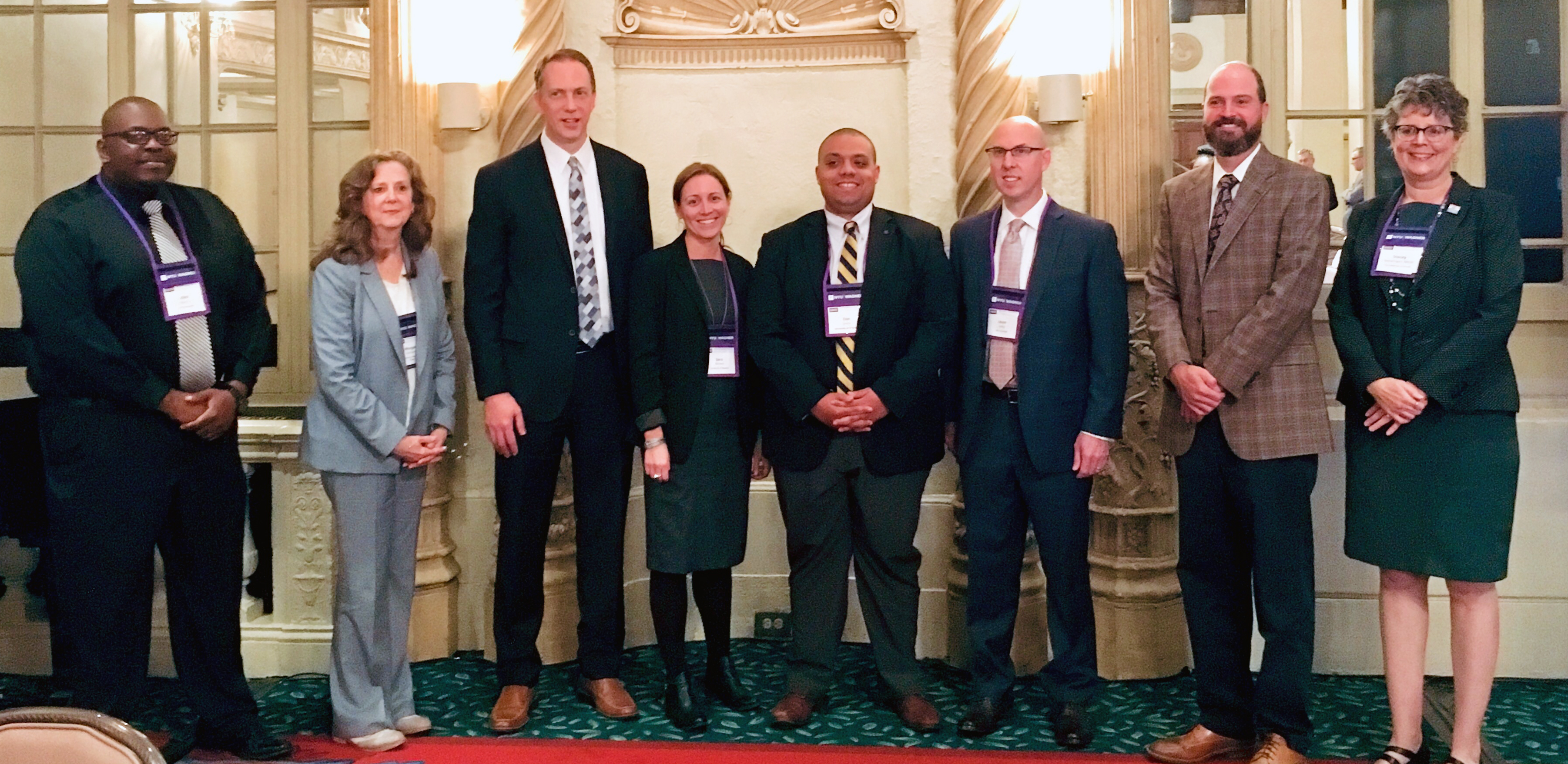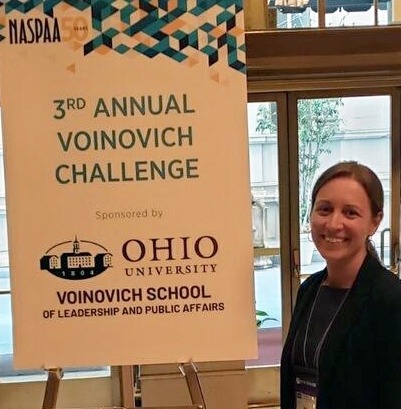University of Montana wins Third Annual Voinovich Public Innovation Challenge

The University of Montana Master of Public Administration Program was the winner of the Third Annual Voinovich Public Innovation Challenge, sponsored by Ohio University’s Voinovich School of Leadership and Public Affairs, in conjunction with the Network of Schools of Public Policy, Affairs, and Administration (NASPAA) during their 2019 annual conference in Los Angeles, California.
Dr. Sara Rinfret, chair of the Department of Public Administration & Policy for University of Montana, presented the winning innovation project, “Exploring How Robots Provide an Accessible MPA Education.” The project was awarded $3,500 to further its development.
Through annual student feedback surveys, Rinfret realized the pressing need for students to be able to access a course online, while still getting an experience in the classroom. In 2017, through a small grant, Rinfret was able to make this happen with the use of robots. Two students per semester were invited to participate as a robotic student. The robot was situated in the classroom and the online student had the ability to move it around, engage with classmates, and participate in real time group discussions.
“In…Montana, 1 out of 3 individuals live 60 miles or more from a college or university. Because of this, we offer in person, online, and now robots for online students who can now physically be in the classroom again,” Rinfret said.
The annual competition was developed as a collaboration between NASPAA’s Executive Director Laurel McFarland and Voinovich School Dean Dr. Mark Weinberg to honor their friend and colleague, Senator George V. Voinovich by highlighting new strategies for bettering student education and addressing unmet needs.
“Senator Voinovich valued innovation in public service, while at the same time raising up the public servants who practiced it. It is great to see Ohio University’s Voinovich School honoring his legacy through this unique competition,” McFarland said.
Winning the Public Innovation Challenge was also a special privilege for Rinfret, given her tie to Senator Voinovich.
“I grew up in Ohio, in a rural community, and interned for Senator Voinovich as an undergraduate student. It is an unbelievable honor to carry out his mission to empower and serve the public,” Rinfret said.
In fact, the University of Montana Master of Public Administration Program plans to purchase a third robot with their prize money and name it “George,” after George Voinovich.
The other three competition finalists were:
- Syracuse University Maxwell School of Citizenship and Public Affairs, which pitched Maxwell X Lab, an organization building partnerships with the nonprofit and public to understand the precise impact of changes.
- University of North Carolina Chapel Hill School of Government, which presented, “Exploring the Intersections between Local Government and Human Trafficking”
- University of Southern California Sol Price School of Public Policy, which pitched, “Homelessness Policy Research Institute Research Accelerator,” an initiative that convenes researchers and policymakers to help design and coordinate actionable research to end homelessness in Los Angeles County.
The three Honorable Mentions were:
- University of Nebraska Omaha School of Public Administration - “Women and Public Policy Program”.
- Boise State University School of Public Service -“Certificate in Applied Public Administration”.
- Brandeis Heller School of Social Policy and Management - “The Heller School Summer Institute”
A panel of three judges were tasked with scoring the presentations: Stacey Swearingen White, director of the School of Public Affairs and Administration at University of Kansas; Dan Smith, MPA director at the Biden School of Public Policy and Administration at the University of Delaware; and Alex Murray, director of online academic programs at the Voinovich School.“I was honored to serve on the judging panel. It was great to see the outstanding, innovative ideas being generated at NASPAA's member schools. Every one of the four proposals were interesting and inspiring,” White said.NASPAA began including the competition in their annual conference three years ago; it was a natural alignment with their mission is to ensure excellence in public service education and promote the ideal of public service.“NASPAA really values experiential teaching and learning in public affairs education, and this pitch competition is a perfect example of the usefulness of this approach,” McFarland said.

